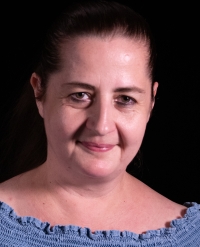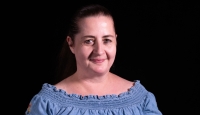Monika Le Fay, roz. Elšíková
* 1968
-
“They were looking for me in Gottwaldov, but I got away on a demonstration. We always went a young man - a young woman, a young man - a young woman and they sometimes let someone go through. I was dressed up and gave the impression that I was not from the underground movement. They let me go through to the Wenceslas Square and then I got through the police cordon to the other side. I was standing in the Wenceslas Square, there were policemen and the crowd behind them that was shouting. And as I was walking along, I could not help myself, I did not plan it but I turned around to face the people who were standing behind the policemen and I shouted: ‘Long live Václav Havel!‘ I enjoyed my 15 minutes of fame. People started shouting. However, the policemen naturally grabbed me, and it ended like this. They took me to the bus, and they took me for interrogations and to Jesenice and to Ruzyně.”
-
“I remember that he [father - Ed.] would go to work and come home in the evening and he would listen to Radio Free Europe during my whole childhood. It was on the whole day, from morning, till evening. And he felt that his life had been completely ruined. I think that his choice turned against him. We were raised in anti-communist spirit. Relatives sent us parcels from Australia and greetings from Brazil. We knew that there was better world. But we could not go there.”
-
“Samizdat books spread a lot in Zlín. We collected different things, made them, printed and came up with them. For example, we launched a petition for Standa Devátý, who was prosecuted and was at risk of dying. So, I went to see my friend Radka Chovancová and we came up with a petition and we put A Few Sentences on the other side of the page. We managed to get maybe several dozens of young people who guaranteed and said that they wanted to be imprisoned instead of Standa. That they did not want to live in a country that broke human rights. And the State Security officers were really furious at it. They knew that there were some dissidents and grey area [in Gottwaldov - Ed.]. However, it was really clever from us - to find people who were neither dissidents nor in Samizdat. It looked as if the resistance was spreading.”
-
“You can´t imagine that it was difficult to get paper at that time. For example, I remember that people took it in a printing company. And then you went by trolleybus with a ream of paper and so everyone knew what you were going to do. It was not like today. Why do you need paper? And why do you need so much paper? I knew where a cyclostyle was. And the policemen really wanted me to tell it. They threatened me that they would kill me and that they would put me with prostitutes. I do not even want to remember it now. The whole thing was horrible. And everything happened just because they wanted to know where the cyclostyle was. I naturally did not say anything. A conspiracy of many people was necessary. There was a lot of delicate work with it. For example, stacking. It means that when you have a lot of sheets, you have to stack them into files and then you walk around and stack the files. It is really difficult and annoying. And someone has to copy it as well. There was a lot of hard work behind the things...”
-
“I wrote a book about it, so I do not want to narrate it now in two sentences. I can only say that I did not want to meet him, I was not interested in him. And it ended the way that I am the only person who is baptised after him - I am Monika Anastázie - and he died in my arms. His last sentence was: ‘I told the monks that you were Monika Anastázie.’ Our lives were so somehow interconnected even though I did not want to be baptised. [...] For me, he is a man who can put up with everything and it does not ruin him. Mainly because he is not negative and mean to other people and on the contrary, it makes him stronger. And maybe I could finish with a sentence of Ivan Martin Jirous who was a well know agitator and who, after Anastáz Opasek returned after an eleven-year sentence where he had been in solitary confinement for two years and had almost lost his mind, told him: ‘You Catholics were really crying out for the imprisonment.’ And the abbot not only did not feel insulted, but he nodded his head and said: ‘You know, you are right.’ And Jirous was not able to say anything and admired him since then and he wrote a beautiful poem about him.”
-
Celé nahrávky
-
Praha, Hroznová, 24.05.2019
(audio)
délka: 01:23:15
Celé nahrávky jsou k dispozici pouze pro přihlášené uživatele.
We knew that there was better world
Monika Le Fay, née Elšíková, was born on the 5th of November 1968 in the then Gottwaldov. She grew up with older sister Aranka in house of a mechanical engineer Ladislav Elšík and a nurse Barbora, née Hoblová. They lived in a local part Lazy. The father´s part of family were victims of persecution of farmers and Monika inherited so called bourgeois origin from her grandmother, her mother´s mother. After finishing primary school, she started to attend a grammar school in Otrokovice, and she passed entrance exams for The Theatre Faculty of the Academy of Performing Arts in Prague (DAMU) in the fourth year of studies. She was in touch with dissidents from Zlín since the half of the 1980s and she took part in printing and spreading of anti-government petition. She became a signatory to Charter 77 and signed the declaration A Few Sentences. State Security interrogated her several times in connection with printing and spreading of Samizdat and because of her attendance at unauthorized meetings. She was detained in the demonstration on the 21st of August 1989. She was in custody for more than 48 hours and then was taken for interrogation to Gottwaldov. She had the first judicial hearing on the 17th of November 1989. She was not judged thanks to the events that followed and the threat of imprisonment or financial penalty and the ban of stay in the capital city were never imposed. She joined Civic Forum in Zlín during the days of the Velvet Revolution. She started and published an occasional magazine of Civic Forum „For Happier Tomorrows”. After having been expelled from The Theatre Faculty of the Academy of Performing Arts in Prague during totalitarianism, she decided to study screenwriting at The Film and TV School of the Academy of Performing Arts in Prague (FAMU) in the times of freedom. She filmed many documents (e.g. Václav Havel´s Last Departure, 04826 Jirous) and she is listed as a scriptwriter and director in dozens of television films and several feature films. She also participated in news reports of the programme of the Czech Television “Reportéři” (Reporters). She published for example memories of political prisoner Dagmar Šimková in her publishing house. She is dedicated to the topics of human rights and she fights for children‘s and animal rights. The monument to the victims of communism in Prague was built thanks to her initiative. In 2016, she received the certificate of participant in the third resistance for her activity during the communist totalitarianism.

